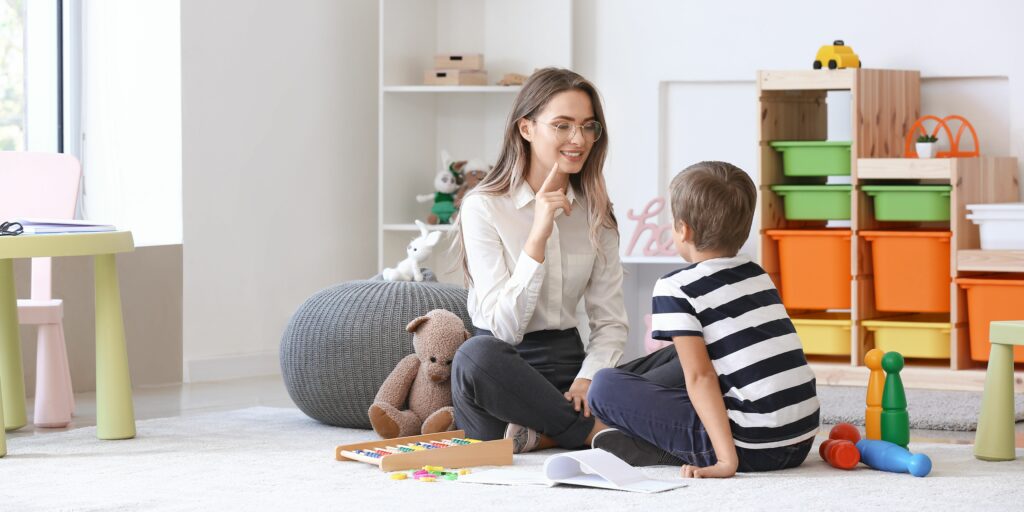Strategies To Enhance Speech and Language Development in Children

Speech and language development in children starts from birth. Children are born with an innate ability to learn language. Their hearing starts developing even before birth in the womb at around 3 months. From the moment they are born, they are exposed to the spoken language around them. The more they are spoken to, the better their language development. Children learn to understand language first and then learn to speak on their own. At every stage, language stimulation is important to facilitate a child’s verbal communication.
75% of a child’s brain growth has occurred by the age of 2 years. This is the period when their brain is maturing. The stimulation provided during this period has the maximum impact on the child. Language stimulation is important for all areas of child development. Infants and children who are exposed to verbal interactions from a very early age exhibit more advanced linguistic skills than children who aren’t provided adequate language stimulation.
TIPS FOR LANGUAGE STIMULATION:
- Eye contact: Make eye contact with your child when you talk to him/her. Also, hold the toys close to your face at eye level as you talk to the child. Whenever possible, try to bend down to your child’s level so that he/she can see your face.
- The slow rate of speech: Speak slowly while talking to your child
- Short sentences: Use short, simple sentences according to the child’s age.
- Self-talk: Talk to your child about the activities you are doing throughout the day. Allow your child to observe your actions while hearing you talk about what you are doing. For e.g.: “I am opening the refrigerator and taking out the apple. Now I am going to take a knife and cut the apple into pieces.”
- Parallel talk: Follow your child’s lead. Give a running commentary about the activities your child is doing or the object that he is interested in. Talk the way your child would have spoken about what he/she is doing. For e.g.: “You are playing with the ball. You are kicking the ball now. The ball is under the bed.”
- Focused stimulation: Take a particular word or phrase as a target and use it repeatedly in different contexts while interacting with your child. For e.g.: (Target word ‘Dog’) “Look at the dog in the picture. This is a brown dog. The dog has four legs. There is a dog on the street.”
- Modeling: Always model the correct production of words, phrases, or sentences for your child. Children learn a lot through modeling. If your child makes a mistake, instead of correcting him/her, model the correct production while he/she is paying attention. This will help your child learn speech and language skills better. Correcting your child frequently may make him/her hesitant to initiate communication.
- Imitation: Encourage your child to imitate different sounds, words, phrases, or sentences according to the child’s level of communication. If your child finds it difficult to imitate sounds, encourage him/her to imitate actions or manipulation of movements first.
- Expansion: When your child says a word or a two-word phrase, expand the word/words to make it a short phrase or sentence. For e.g.: When he/she child says ‘’apple’’ you say “Give apple’’ or when he/she says “Red apple” you say “ Red tasty apple”
- Verbal routine: Having the same set of statements or instructions during daily routine can help promote speech and language skills faster. The repeated use of these phrases/ sentences helps your child remember them.
- Binary choices: Give opportunities for your child to choose between two items. For e.g.: “Do you want ice cream or chocolate?” “Do you want an apple or a banana?” He may respond verbally or using gestures or pointing.
- Reading to your child: Make it a habit to read to your child daily. For a child to remember and retain a new word, it is better to read the same book for many days rather than read a new book each day.
- Avoid asking questions all the time: Avoid constantly asking questions like “What is this?” to your child. Instead, make more statements or talk more about the activity or object.
- Commands: Help your child understand and follow commands starting with simple and then moving to complex commands. For e.g.: simple command- “Give me a book’’. Complex- “Open the bag, take out the book, and give it to me’’.
- OWL (Observe, wait, listen): Always follow this approach with your child. Observe what your child is doing. Wait for him/her to initiate interaction and indicate what he/she wants to do. Listen to him/her and make an effort to understand what he/she is trying to communicate.
- Create opportunities to communicate: Create as many opportunities as possible for your child to communicate. Instead of providing everything, wait for your child to request things.
Lack of adequate language skills can lead to delays in speech and language development. Consult a Speech-Language Pathologist in case you feel your child doesn’t have age-appropriate language skills, and get to know how you can play a vital role in your child’s Speech and Language development.